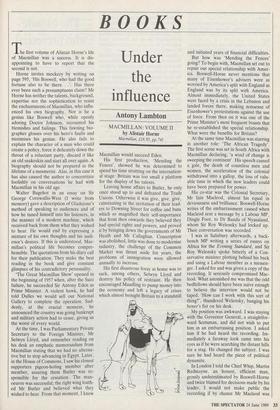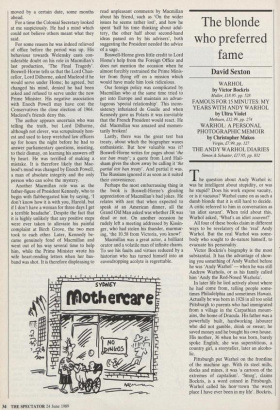BOOKS T he first volume of Alistair Horne's life of Macmillan
was a success. It is dis- appointing to have to report that the second is not.
Home invites mockery by writing on page 595, 'His Boswell, who had the good fortune also to be there. . .'. Has there ever been such a presumptuous claim? Mr Home has neither the talents, background, expertise nor the sophistication to resist the enchantments of Macmillan, who influ- enced his own biography. Nor is he a genius like Boswell who, while openly adoring Doctor Johnson, recounted his blemishes and failings. This fawning bio- grapher glosses over his hero's faults and minimises his genius. He also fails to explain the character of a man who could create a policy, force it delicately down the throat of a reluctant party, discard it like an old snakeskin and start all over again. A biography should not be prepared in the lifetime of a mesmerist. Alas, in this case it has also caused the author to concentrate foolishly on conversations he had with Macmillan in his old age.
Walter Bagehot in an essay on Sir George Cornwallis-West (I write from memory) gave a description of Gladstone's method of speaking to audiences and of how he tuned himself into his listeners, in the manner of a modern machine, which received back from them what they wished to hear. He would end by expressing a mixture of his own thoughts and his audi- ence's desires. If this is understood, Mac- millan's political life becomes compre- hensible. The quotations from his diary call for their publication. They make the best reading in the book and give constant glimpses of his contradictory personality.
`The Great Macmillan Show' opened in the beginning of 1957 when, after the Suez failure, he succeeded Sir Antony Eden as Prime Minister. A violent hawk, he had told Dulles we would sell our National Gallery to complete the operation. Sud- denly, at the crucial moment, he announced the country was going bankrupt and military action had to cease, giving us the worst of every world.
At the time, I was Parliamentary Private Secretary to the Foreign Minister, Mr Selwyn Lloyd, and remember reading on his desk an emphatic memorandum from Macmillan stating that we had no alterna- tive but to stop advancing in Egypt. Later, in the House of Commons, I saw his closest supporters pigeon-holing member after member, assuring them Butler was re- sponsible for the cessation. The man- oeuvre was successful; the right wing loath- ed Mr Butler and believed what they wished to hear. From that moment, I knew
Under the influence
Antony Lambton
MACMILLAN: VOLUME II by Alistair Horne
Macmillan, f16.95, pp.741
Macmillan would succeed Eden.
His first production, 'Mending the Fences', showed he was determined to spend his time strutting on the internation- al stage: Britain was too small a platform for the display of his talents.
Leaving home affairs to Butler, he only once stood up to and defeated the Trade Unions. Otherwise it was give, give, give, culminating in the invitation of their lead- ers to Downing Street for coffee and buns which so magnified their self-importance that from then onwards they believed they had special rights and powers, and proved it by bringing down the governments of Mr Heath and Mr Callaghan. Conscription was abolished, little was done to modernise industry, the challenge of the Common Market was thrust aside for years, the problems of immigration were allowed annually to increase.
His first disastrous foray at home was to sack, among others, Selwyn Lloyd and destroy his policy of restraint. He then encouraged Maudling to pump money into the economy and left a legacy of crises which almost brought Britain to a standstill and initiated years of financial difficulties.
But how was 'Mending the Fences' going? To begin with, Macmillan set out to repair our special relationship with Amer- ica. Boswell-Horne never mentions that many of Eisenhower's advisers were as worried by America's split with England as England was by its split with America. Almost immediately, the United States were faced by a crisis in the Lebanon and landed forces there, making nonsense of Eisenhower's protestations against the use of force. From then on it was one of the Prime Minister's most frequent boasts that he re-established the special relationship. What were the benefits for Britain?
At the same time Macmillan was starring in another role: 'The African Tragedy'. The first scene was set in South Africa with Macmillan declaring, 'a wind of change is sweeping the continent'. His speech caused a gale, the death of countless men and women, the acceleration of the colonial withdrawal into a gallop, the loss of valu- able time in which the new leaders could have been prepared for power.
His co-star was the Colonial Secretary, Mr Iain Macleod, almost his equal in deviousness and brilliance. Boswell-Horne writes of the embarrassment caused when Macleod sent a message by a Labour MP, Dingle Foot, to Dr Banda of Nyasaland, whom Sir Roy Welensky had locked up. Their conversation was recorded.
I was in Salisbury afterwards, a back- bench MP writing a series of essays on Africa for the Evening Standard, and Sir Roy Welensky spoke bitterly of a Con- servative minister plotting behind his back and using a Labour member as a messen- ger. I asked for and was given a copy of the recording. It seriously compromised Mac- leod. What astonished me was that the odd bedfellows should have been naive enough to believe the interview would not be taped. 'How can I work with this sort of thing?', thundered Welensky, banging his boxer's fist on his desk.
My position was awkward. I was staying with the Governor General, a straightfor- ward Scotsman, and did not wish to put him in an embarrassing position. I asked him if he had heard the recording. Im- mediately a faraway look came into his eyes as if he were searching the distant hills for a stag. He changed the subject. I was sure he had heard the piece of political dynamite.
In London I told the Chief Whip, Martin Redmayne, an honest, efficient man, grossly underestimated by Boswell-Horne and twice blamed for decisions made by his leader, I would not make public the recording if by chance Mr Macleod was moved by a certain date, some months ahead.
For a time the Colonial Secretary looked at me suspiciously. He had a mind which could not believe others meant what they said.
For some reason he was indeed relieved of office before the period was up. His behaviour towards Welensky casts con- siderable doubt on his role in Macmillan's last production, 'The Final Tragedy'. Boswell-Horne tells us that the Lord Chan- cellor, Lord Dilhorne, asked Macleod if he would serve under Home; he agreed, but changed his mind, denied he had been asked and refused to serve under the new Prime Minister. His negative association with Enoch Powell may have cost the Conservatives the close election of 1964. Macleod's friends deny this.
The author appears uncertain who was telling the truth, but Lord Dilhorne, although not clever, was scrupulously hon- est and used to keep wretched law officers up for hours the night before he had to answer parliamentary questions, insisting, to their dismay, on learning his answers off by heart. He was terrified of making a mistake. It is therefore likely that Mac- leod's mind was changed by Enoch Powell, a man of absolute integrity and the only person who can solve the mystery.
Another Macmillan role was as the father-figure of President Kennedy, who to begin with flabbergasted him by saying, 'I don't know how it is with you, Harold, but if I don't have a woman for three days I get a terrible headache'. Despite the fact that it is highly unlikely that any positive steps were ever taken to alleviate his painful complaint at Birch Grove, the two men took to each other. Later, Kennedy be- came genuinely fond of Macmillan and went out of his way several time to help him, while the Prime Minister wrote his wife heart-rending letters when her hus- band was shot. It is therefore displeasing to read unpleasant comments by Macmillan about his friend, such as 'On the wider issues he seems rather lost', and how he spent 'half his time thinking about adul- tery, the other half about second-hand ideas passed on by his advisers', both suggesting the President needed the advice of a sage.
Boswell-Horne gives little credit to Lord Home's help from the Foreign Office and does not mention the occasion when he almost forcibly restrained the Prime Minis- ter from flying off on a mission which would have made him look ridiculous.
Our foreign policy was complicated by Macmillan who at the same time tried to get into Europe and maintain an advan- tageous 'special relationship'. This incon- sistency infuriated de Gaulle and when Kennedy gave us Polaris it was inevitable that the French President would react. He did. Macmillan was amazed and momen- tarily broken!
Lastly, there was the great test ban treaty, about which the biographer waxes enthusiastic. But how valuable was it? Boswell-Horne writes for pages about 'the test ban treaty'; a quote from Lord Hail- sham gives the show away be calling it 'the partial test ban treaty'. And partial it was. The Russians ignored it as soon as it suited their convenience.
Perhaps the most embarrassing thing in the book is Boswell-Horne's gloating appreciation of Macmillan's bad jokes. He relates with zest that when expected to speak at an American dinner, all the Grand Old Man asked was whether JR was dead or not. On another occasion he rudely left a meeting addressed by Kissin- ger, who had stolen his thunder, murmur- ing, 'the 10.58 from Victoria, you know!'
Macmillan was a great actor, a brilliant orator and a volatile man of infinite charm. To see his faults and virtues reduced by a historian who has turned himself into an eavesdropping acolyte is regrettable.











































































 Previous page
Previous page